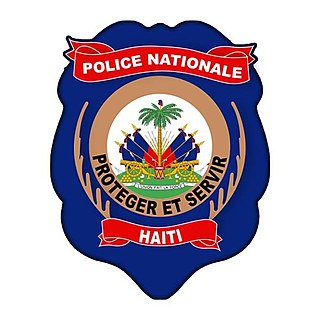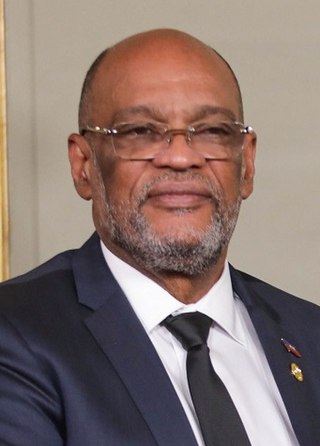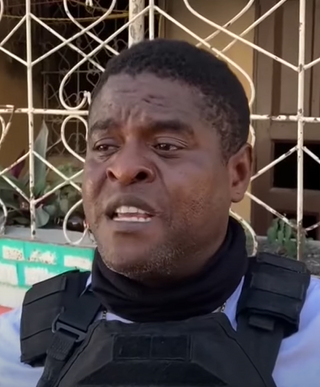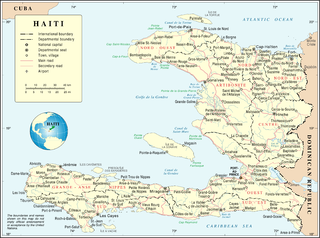Related Research Articles

The Haitian National Police is the law enforcement and de facto police force of Haiti. It was created in 1995 to bring public security under civilian control as mandated in Haiti's constitution. As of 2023, the force has 9,000 active duty officers.

Jovenel Moïse was a Haitian politician and entrepreneur, who served as the 43rd president of Haiti from 2017 until his assassination in 2021. He assumed the presidency in February 2017 after winning the November 2016 election. During his term, Haiti experienced widespread protests and unrest. In the early morning of 7 July 2021, Moïse was assassinated, and his wife Martine was injured during an attack on their private residence in Pétion-Ville. Claude Joseph assumed the role of acting president in the aftermath of Moïse's assassination.

Platfòm Pitit Desalin, named after Haitian revolutionary leader Jean-Jacques Dessalines, is a Haitian political party led by Jean-Charles Moïse. As of 11 April 2018, the party had two seats in the Chamber of Deputies and one seat in the Senate. Since January 10, 2023, both houses of parliament in Haiti have been vacant. The party leader, Jean-Charles Moïse, resigned as Senator in protest of an alleged bribe of $2.5 million offered to him by allies of President Michel Martelly and in order to run for president in the 2015 presidential election. He received 14.3% of the popular vote and came in third place. In the aftermath of the election, the party played a major role in the opposition protests against eventual winner Jovenel Moïse.
On 13 November 2018, a massacre began within the La Saline slums of Port-au-Prince, Haiti. According to reports, at least 71 civilians were killed over a 24-hour period. It is alleged that the killings were either due to local gang wars or the actions of Haitian officials attempting to quell anti-corruption protests.

The current political, economic, and social crisis began with protests in cities throughout Haiti on 7 July 2018 in response to increased fuel prices. These protests gradually evolved into demands for the resignation of the president, Jovenel Moïse. Led by opposition politician Jean-Charles Moïse, protesters demanded a transitional government, provision of social programs, and the prosecution of corrupt officials. From 2019 to 2021, massive protests called for the Jovenel Moïse government to resign. Moïse had come to power in the 2016 presidential election, which had voter turnout of only 21%. Previously, the 2015 elections had been annulled due to fraud. On 7 February 2021, supporters of the opposition allegedly attempted a coup d'état, leading to 23 arrests, as well as clashes between protestors and police.

Jean-Michel Lapin is a Haitian politician who served as acting Prime Minister of Haiti from 2019 to 2020.
Events in the year 2021 in Haiti.

Jovenel Moïse, the 43rd president of Haiti, was assassinated on 7 July 2021 at 1 am EDT (UTC−04:00) at his residence in Port-au-Prince. A group of 28 foreign mercenaries, mostly from Colombia, are alleged to be responsible for the killing. First Lady Martine Moïse was also shot multiple times in the attack, and was airlifted to the United States for emergency treatment. Later in the day, USGPN killed three of the suspected assassins and arrested 20 more. A manhunt was launched for other gunmen as well as the masterminds of the attack. Haitian chief prosecutor Bedford Claude confirmed plans to question Moïse's top bodyguards; none of the president's security guards were killed or injured in the attack. US authorities have since arrested eleven suspects alleged to have conspired in the assassination. Martine Moïse and former prime minister Claude Joseph were formally charged on 19 February 2024 with conspiring in the assassination.

Ariel Henry is a Haitian neurosurgeon and politician who served as the acting prime minister after the assassination of Jovenel Moïse, until his formal resignation on 24 April 2024. During this period where the role of the head of state was vacant, the Council of Ministers he presided exercised executive power. He also served as the acting Minister of Interior and Territorial Communities.

Jimmy Chérizier, nicknamed Barbecue, is a Haitian gang leader, former police officer, and warlord who is the head of the Revolutionary Forces of the G9 Family and Allies, abbreviated as "G9" or "FRG9", a federation of over a dozen Haitian gangs based in Port-au-Prince. Known for often making public appearances in military camouflage and a beret, he calls himself the leader of an "armed revolution". Considered the most powerful armed revolutionary leader in Haiti, he is also currently believed to be one of the country's most powerful figures.
In July 2022, an outbreak of gang violence occurred in the Haitian capital of Port-au-Prince, leaving 89 people dead and over 74 injured.
Events in the year 2022 in Haiti.
The socioeconomic and political crisis in Haiti has been marked by rising energy prices due to the 2022 global energy crisis, as well as protests, and civil unrest against the government of Haiti, armed gang violence, an outbreak of cholera, shortages of fuel and clean drinking water, as well as widespread acute hunger. It is a continuation of instability and protests that began in 2018.

Since 2020, Haiti's capital Port-au-Prince has been the site of an ongoing gang war. The government of Haiti and Haitian security forces have struggled to maintain their control of Port-au-Prince amid this conflict, with gangs reportedly controlling up to 90% of the city by 2023. In response to the escalating gang fighting, an armed vigilante movement, known as bwa kale, also emerged, with the purpose of fighting the gangs. On 2 October 2023, United Nations Security Council Resolution 2699 was approved, authorizing a Kenya-led "multinational security support mission" to Haiti. Until 2024, the war was between two major groups and their allies: the Revolutionary Forces of the G9 Family and Allies and the G-Pep. However, in February 2024 the two rival gangs formed a coalition opposing the government and the UN mission.
Events in the year 2023 in Haiti. Haiti still had no president, no parliamentary quorum, and a dysfunctional high court due to a lack of judges, with another news report of violent uprisings across the country, realizing they were sent by the gangs while the other families and neighbors escape from a burning capital Port-au-Prince. The government invoked a martial law across Haiti in an effort to contain gang violence. The police and the military are forced to withdraw from their posts when their bases and police stations throughout Haiti are destroyed by more gangs who had also planted weapons in the area to provoke participation. Haiti is effectively destroyed by violence that no longer controls the island country after its long history of natural disasters and political chaos, more than three million Haitian migrants sailed to Florida in the U.S. as refugees, and black civilians in Haiti are rallying to fight back against gang corruption.
Between November 29 and 30, 2022, 20 people were killed by armed gangs in the town of Cabaret, a suburb of the Haitian capital of Port-au-Prince.
The Bel Air massacre was a series of shootings, extrajudicial killings, and massacres that took place in the Bel Air neighborhood of Port-au-Prince, Haiti between August 2020 and May 2021. Between August and October 2020, G9 An Fanmi e Alye members attacked Bel Air residents, with continued attacks by the affiliated Krache Dife gang. The massacres died down until March 31, whenever renewed attacks began, sparking battles with Bel Air residents who defended themselves.
Events in the year 2024 in Haiti.
The political history of North America in the 2020s covers political events on the continent, other than elections, from 2020 onwards.

Amid the unrest in Haiti since 2018, armed gangs stormed Haiti's two largest prisons in March 2024, resulting in more than 4,700 inmates escaping. The gangs demanded that prime minister Ariel Henry resign, attacking and closing Toussaint Louverture International Airport and preventing Henry from entering the country. The Haitian government declared a 72-hour state of emergency and a nighttime curfew in Ouest Department in an attempt to curb the violence and chaos. On 12 March 2024, Henry indicated his intention to resign as prime minister in response to the deteriorating security situation.
References
- 1 2 "Gangs of Haiti: Expansion, power, and an escalating crisis" (PDF). Global Initiative Against Transnational Organized Crime. October 2022. Retrieved January 22, 2024.
- 1 2 3 4 "Haitian gangs' gruesome murders of police spark protests as calls mount for U.S., Canada to intervene - CBS News". www.cbsnews.com. 2023-01-27. Retrieved 2024-01-22.
- 1 2 3 4 5 6 "Haiti - FLASH : 18 police officers victims of armed gangs in 16 days - HaitiLibre.com : Haiti news 7/7". www.haitilibre.com. Retrieved 2024-01-22.
- ↑ "iciHaiti - PNH : Attack on a patrol car, 1 policeman killed another injured - iciHaiti.com : All the news in brief 7/7". IciHaiti.com. Retrieved 2024-01-22.
- ↑ "De nouvelles victimes dans les rangs de la PNH provoquent des scènes de colère dans le pays . Le Nouvelliste". lenouvelliste.com. Retrieved 2024-01-22.
- ↑ "iciHaiti - Insecurity : 6 police officers killed in clashes with the «Gran grif» gang - iciHaiti.com : All the news in brief 7/7". IciHaiti.com. Retrieved 2024-01-22.
- 1 2 3 Charles, Jacqueline (January 27, 2023). "Violence erupts in Haiti during protests by police officers after gangs kill six cops". Miami Herald. Retrieved January 22, 2024.
- ↑ "Haitian police rebels protest is paralyzing Port-au-Prince". AP News. 2023-01-26. Retrieved 2024-01-22.
- ↑ "Haitian police rebels protest gang killings of officers". jamaica-gleaner.com. 2023-01-27. Retrieved 2024-01-22.
- 1 2 Mérancourt, Widlore; Parker, Claire (2023-03-31). "Haitian police, angered by officer killings, attack PM's home, airport". Washington Post. ISSN 0190-8286 . Retrieved 2024-01-22.